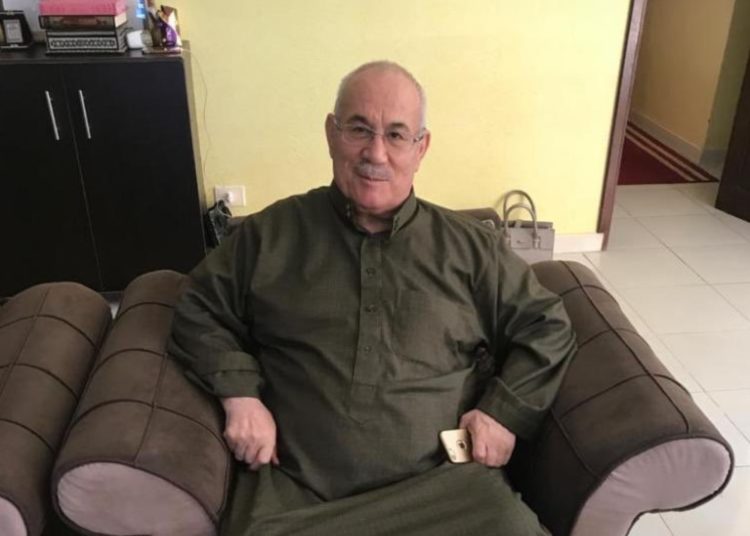Abdullah Bozkurt/Stockholm
In a bizarre and twisted case of a criminal prosecution against a critic of President Recep Tayyip Erdoğan in Egypt, the Turkish government continues to press charges against the man, who passed away and was buried in the North African country.
Ali Bayram, an educator who was affiliated with the Gülen movement, a group that is opposed to the Erdoğan regime, died on June 2, 2020 after suffering a brain hemorrhage in Egypt, where he had been living in exile.
The Turkish government repeatedly asked for his extradition, but Egypt refused to send him back to Turkey, where he would face abuse and torture and stand trial on fabricated charges.
Although he had been dead for a year and half, a Justice Ministry letter to the prosecutor’s office on December 22, 2021 obtained by Nordic Monitor shows that the Erdoğan government is continuing to pursue charges against him.
Bayram remained a suspect in a court case despite the fact that his death was reported to the Ankara Chief Prosecutor’s Office by the Foreign Ministry on June 4, 2020 and the Interior Ministry on June 9, 2020. The Justice Ministry also recorded his death and informed the prosecutor’s office on June 17, 2020.
Justice Ministry’s letter of December 22, 2021:
What is more, a copy of the population registry submitted to the prosecutor’s office by a clerk on December 30, 2021 listed him as alive.
A document obtained by Nordic Monitor on January 4, 2022 from the National Judiciary Informatics System (UYAP), a government network that publishes court documents, still shows Bayram as a defendant in the case, meaning that the outstanding charges against him are still pending and that he faces an arrest warrant in his grave.
The 70-year-old education volunteer devoted his life to the education of young people and was deeply committed to improving the quality of education. He helped establish several schools in Turkey, Azerbaijan and Kazakhstan. He was a member of the board of trustees of Fatih University, which was linked to the Gülen group. The university was first seized by the Erdoğan government and was subsequently shut down.
The Ankara 8th Criminal Court of Peace issued an arrest warrant for Bayram in November 2015 following a request by the Ankara Public Prosecutor’s Office’s Bureau for Crimes against the Constitutional Order, which was conducting a government-backed investigation into Gülen movement members. The court also issued warrants for journalists such former Zaman daily Editor-in-Chief Ekrem Dumanlı and former Zaman daily owner Alaeddin Kaya.

To escape wrongful imprisonment, Bayram had to cross into Greece illegally before eventually settling in Egypt, where he lived in exile until his death. However, the Erdoğan government’s hunt for him never ceased.
An extradition request for Bayram was filed on February 2, 2017 by the Ankara Chief Public Prosecutor’s Office, and the Justice Ministry forwarded the request to the Foreign Ministry on July 3, 2017 to start the official extradition process.
A Justice Ministry communication dated June 17, 2020 and signed by Abdullah Ömeroğlu, a judge and director general of international law and foreign relations at the ministry, revealed that the Turkish Embassy in Cairo had to reiterate the extradition request since Egyptian authorities had declined the request via diplomatic channels
According to the Justice Ministry document, the request for the extradition of Bayram was based on an arrest warrant issued in absentia, under file No. 2016/238, by the Ankara 4th High Criminal Court, for attempting to overturn the constitutional order and setting up or running an armed terrorist group. The document exposed the fact that Bayram was seen as “the leader of a terrorist organization” due to his contributions to schools and institutions affiliated with Fethullah Gülen, the US-based Turkish Muslim scholar who describes terrorism as “the foremost threat to human life” and condemns all kinds of extremist and radical acts.
The population registry excerpt, retrieved on December 30, 2021, still shows Ali Bayram as alive even though he passed away 18 months earlier in Cairo:
The Gülen movement is a group known for its investment in science, education and the promotion of interfaith and intercultural dialogue around the world. The movement is led by Gülen, an outspoken critic of the Turkish president for pervasive corruption in the government and Erdoğan’s support for jihadist groups in Syria. Erdoğan accuses the movement of being behind corruption investigations in 2013 and a coup attempt in July 2016, allegations the movement denies.
In addition to Egypt, many other countries have rejected Turkey’s politically motivated extradition requests for people who were forced to leave their homeland because of an ongoing witch hunt against critics in the aftermath of the coup attempt. In that regard the UN Committee Against Torture decided in June 2019 that the extradition of people who were thought to be members of the movement would constitute a violation of Article 3 of the UN Convention against Torture and Other Cruel, Inhuman or Degrading Treatment or Punishment.
Ali Bayram is still listed as a defendant and suspect in a trial in Turkey according to the court registry obtained by Nordic Monitor on January 4, 2022:
More than a half million people were investigated in Turkey on similar charges following the abortive putsch in 2016. Based on profiling lists, people were arrested, investigated and even prosecuted. Their assets were seized, and their family members and relatives were also the subject of criminal charges. Working as a teacher in Gülen-inspired schools or contributing to non-profit institutions affiliated with the movement abroad are considered to be acts of terrorism by the Erdoğan government.
With the purge and/or imprisonment of 4,560 judges and prosecutors in the 2016-2017 period, the rule of law was effectively suspended and the Turkish judiciary was transformed into a tool of the government, which often abuses the criminal justice system to punish its critics and opponents on terrorism charges.












